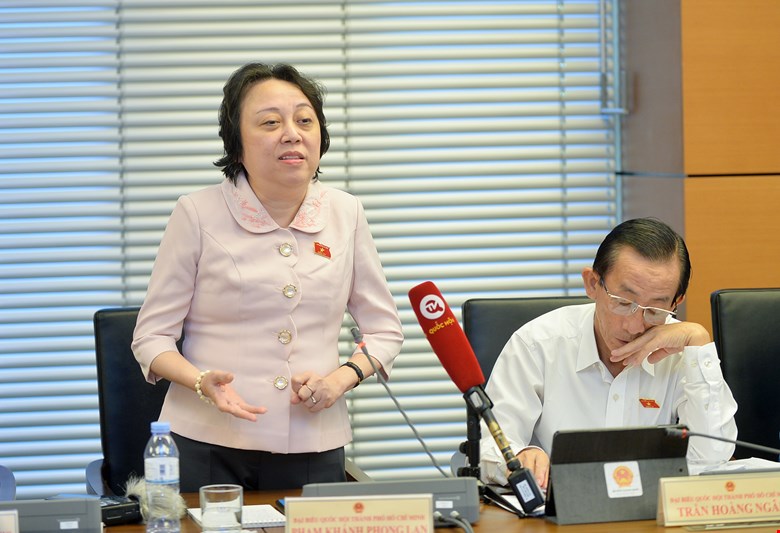Continuing the program of the 9th Session, on the afternoon of May 6, the National Assembly discussed the draft Law amending and supplementing a number of articles of the Law on Product and Goods Quality.
Speaking, delegate Pham Khanh Phong Lan (HCMC delegation) said that it is not until now that the quality of products and goods has become such a big issue, it affects people's daily lives. The most notable of which are directly consumed products such as food, beverage and cosmetics.
The delegate suggested reviewing the burning issues that have not been resolved. If there is a solid legal basis that covers all possibilities, the work of the functional sector will be much less difficult.
As the head of a local industry (Director of the Department of Food Safety of Ho Chi Minh City), the delegate said that despite efforts, the results were not as expected. The delegate cited cases of fake milk, fake medicine... and wondered how this draft law does not distinguish between fake and poor quality goods.
Considering this a big problem, the female delegate said that if a product is being sold for sale, with high value but is counterfeit, sold at an equivalent price, everyone will see that this is a fake goods.
But according to the delegate, currently the goods are produced by themselves and their own brands, but the criteria are being reduced, and if the quality is not guaranteed, are they fake or poor quality? When these two issues are handled, there will be a huge difference.
"Currently, if the form is still below 70% of the announced criteria, that goods are fake. But whether this number needs to be reviewed or not needs to be reviewed," the delegate suggested.
Supporting the view that pre-inspection is not as important as post-inspection, the delegate said that to do so, post-inspection must be truly strengthened, not increase the gap between these two issues. How to increase post-inspection to ensure the quality of goods and products.

The delegate proposed to study and clearly define the compensation mechanism for damages to products that do not ensure quality. This is especially relevant in cases where citizens consume products that the state has declared "safe", but in the end are counterfeit, poor quality goods.
The implementation of the above mechanism will help people avoid losses and difficulties. At the same time, it will motivate users to report problems if they buy defective products, instead of just " sucking the loss".
According to the delegate, currently, when there is no such clear compensation mechanism, people often "swallow bitterness" and have to endure problems with the product.
Regarding the responsibility for state management, delegate Nguyen Nhu So (Bac Ninh delegation) said that the draft needs to be reviewed and adjusted in the direction of increasing transparency, clearly defining the responsibility for state management of each ministry and branch according to the assigned field, avoiding overlap, management laxity or responsibility emptiness.
It is necessary to clearly establish the leading role and an effective inter-sectoral coordination mechanism between state management agencies in the work of inspecting, supervising and handling violations of product and commodity quality.
In fact, the case of nearly 600 fake milk labels being produced and publicly circulating over the past 4 years has clearly exposed the laxity and lack of effective coordination mechanism between state management agencies in controlling the quality of goods.
This is not only an individual incident but also a sign of systematic loopholes in policy design and implementation organization," the delegate commented.











